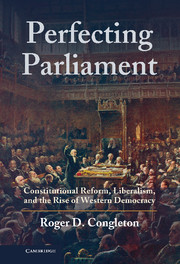Book contents
- Frontmatter
- Contents
- Preface
- 1 On the Origins of Western Democracy
- Part I Sharing Sovereignty
- Part II Historical Evidence on Western Democratic Transitions
- 9 Setting the Stage
- 10 Liberalism and Reform in the Transformative Century
- 11 Fine-Grained Constitutional Bargaining
- 12 An Overview of British Constitutional History
- 13 Constitutional Exchange in the United Kingdom
- 14 The Swedish Transition to Democracy
- 15 Constitutional Reform in the Netherlands
- 16 Germany
- 17 The Japanese Transition to Democracy and Back
- 18 The United States, an Exception or Further Illustration?
- Part III Analytical History as Social Science
- Appendix Methodological Approach, Limits, and Extensions
- References
- Index
12 - An Overview of British Constitutional History
The English King and the Medieval Parliament
Published online by Cambridge University Press: 05 June 2012
- Frontmatter
- Contents
- Preface
- 1 On the Origins of Western Democracy
- Part I Sharing Sovereignty
- Part II Historical Evidence on Western Democratic Transitions
- 9 Setting the Stage
- 10 Liberalism and Reform in the Transformative Century
- 11 Fine-Grained Constitutional Bargaining
- 12 An Overview of British Constitutional History
- 13 Constitutional Exchange in the United Kingdom
- 14 The Swedish Transition to Democracy
- 15 Constitutional Reform in the Netherlands
- 16 Germany
- 17 The Japanese Transition to Democracy and Back
- 18 The United States, an Exception or Further Illustration?
- Part III Analytical History as Social Science
- Appendix Methodological Approach, Limits, and Extensions
- References
- Index
Summary
Chapters Twelve and Thirteen focus on the constitutional history of the United Kingdom. This extended narrative is undertaken for several reasons. England emerged as a nation-state relatively early, which makes its particular institutional developments relatively free from the effects of regional entanglements, although not entirely so. This allows a long and relatively detailed account of its constitutional history to be told without accounting for nation building itself. Although times were often troubled and occasional civil wars occurred, the English king-and-council template for governance has remained in place for essentially eight hundred years. The English case is also the one that is likely most familiar to readers, although few will have much detailed knowledge of its constitutional developments.
This is partly because England has never had a formal constitution or grounding law, and partly because historians tend not to focus much attention on constitutional developments. The written constitution of England consists of dozens of acts of parliament that define and redefine the basic architecture of the government: how the persons who come to hold power are chosen and the constraints under which they may lawfully operate. There is a large literature in the United Kingdom on the subject of constitutional law, although it is little studied outside that country or even acknowledged by scholars from countries with more unified constitutions. English constitutional law is augmented by an elaborate body of unwritten procedures, norms, and conventions that fills the spaces left by its constitutional legislation.
- Type
- Chapter
- Information
- Perfecting ParliamentConstitutional Reform, Liberalism, and the Rise of Western Democracy, pp. 295 - 326Publisher: Cambridge University PressPrint publication year: 2010



